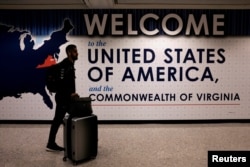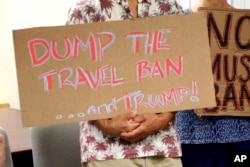The U.S. Supreme Court has canceled arguments on President Donald Trump's travel ban in light of a new order that was signed Sunday.
The announcement comes a day after Trump signed a revised travel ban order, implementing new restrictions for travelers to the United States from eight countries.
In an unsigned order, the court has asked both sides to weigh in by October 5th to decide what to do with the case. The court has been prepared to hear arguments about the legality of Trump's executive order, but the new revised version may call for a new case against it.
“What is going to happen in the Supreme Court now that the travel ban has changed?” asked Jeanne M. Atkinson, executive director of Catholic Legal Immigration at an immigration law and policy conference at Georgetown University Monday.
“I think if you stick around and listen today you are going to hear opinions going all different directions. It is a complex issue because of the changes in the travel ban … It's a new ban; it's going to have to be looked at on its own.
The new travel rules, which take effect on Oct. 18, affect citizens of Chad, Iran, Libya, North Korea, Somalia, Syria, Venezuela and Yemen.
Refusal to share information
U.S. officials said these countries have refused to share information about terrorism and other issues with the United States.
The announcement late Sunday came as Trump's previous temporary ban on visitors from six Muslim-majority countries was expiring, 90 days after it went into effect. The earlier order had barred citizens of Iran, Libya, Somalia, Sudan, Syria and Yemen from entering the U.S. unless they had a “credible claim of a bona fide relationship with a person or entity in the United States.”’
Reaction to the president's order from human-rights organizations and other groups that work with immigrants was swift, and largely negative.
The Council on American-Islamic Relations (CAIR), the nation's largest Muslim civil rights and advocacy organization, said the latest version of the “Muslim ban” that Trump tried to introduce on taking office earlier this year was part of the administration's “ugly white supremacist agenda.”
Trump said in the new proclamation: “As president, I must act to protect the security and interests of the United States and its people. The restrictions announced are tough and tailored, and they send a message to foreign governments that they must work with us to enhance security.”
Sudan dropped from list
The new ban drops Sudan from the list but adds Chad, Venezuela and North Korea to the original six Muslim-majority countries.
“North Korea does not cooperate with the United States government in any respect and fails to satisfy all information-sharing requirements,” the presidential declaration said.
Venezuela was cited for failing to cooperate “in verifying whether its citizens pose national security or public-safety threats.” U.S. officials also said the Caracas government does not willingly receive Venezuelans deported by the United States.
Chad, a “valuable and important” counter-terrorism partner, failed to share terrorism-related and other public safety information, the proclamation said.
Reaction to new ban
Amnesty International lashed out at the new ban.
Since the last ban was “implemented 10 months ago, we have seen families torn apart and whole nations of people demonized for the crimes of a few,” the human-rights group said in a statement Sunday. “The order was a catastrophe not just for those seeking safety but for those who simply want to travel, work or study in the United States. Today's action neither relieves this tension nor keeps anyone safe.”
Trump last week called for a “tougher”’ travel ban after a bomb partially exploded on a London subway.
“The travel ban into the United States should be far larger, tougher and more specific — but stupidly, that would not be politically correct!” Trump wrote in a post on Twitter.
Aline Barros contributed to this report.

